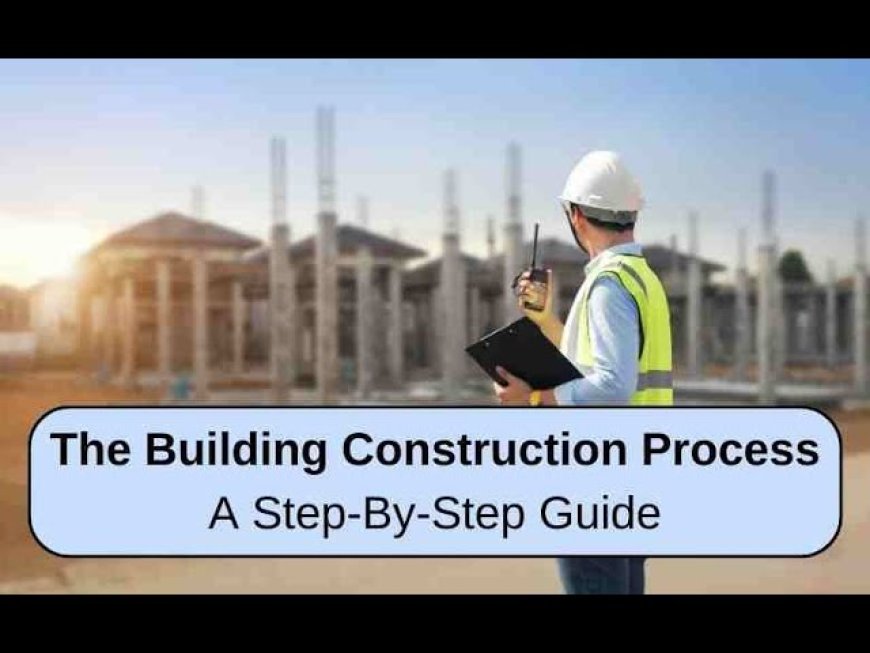What are basic requirement to construct an industrial building
Building an industrial building is a complicated process that requires effective management, careful planning, and compliance with regulations.

Developing a industrial structure is a critical endeavor that includes cautious preparation, compliance with guidelines, and joint efforts with different partners. Whether you're thinking about industrial buildings for sale or hoping to create your own, it is pivotal to figure out the fundamental prerequisites. This article frames the basic advances associated with developing a industrial structure, with an emphasis on "industrial property management" and "industrial buildings for sale."
Zoning and Land Use Regulations
Understanding Zoning Laws
Making sure the site is suitably designated for industrial use is crucial before starting any building. Zoning rules regulate the use of land in certain places and differ depending on the locality.
Zoning for Industries: Check to see if the property is zoned for industrial use. This assignment considers assembling, warehousing, and other industrial tasks.
Allowed Utilizations: Indeed, even inside industrial zones, certain exercises might be confined. It's critical to check what sorts of enterprises are permitted and whether your arranged exercises line up with nearby guidelines.
Compliance to Land Use Plans
In addition to zoning, the construction must adhere to more comprehensive local government land use plans.
End-all strategies: Neighborhood specialists frequently have end-all strategies that frame long haul advancement objectives. To be approved, your industrial building must conform to these plans.
Natural Contemplations: A few regions might have ecological limitations, like wetlands or natural life environments, that limit development exercises.
Site Determination and Readiness
Picking the Right Area
Choosing the right area for your industrial structure is quite possibly of the most basic choice you'll make. Everything, from operational effectiveness to property value, will be affected by the location.
Infrastructure closeness: Take into consideration how close you are to ports, highways, and other transportation networks. For effective distribution and logistics, having access to these networks is essential.
Utilities Accessibility: Guarantee that the site approaches fundamental utilities like power, water, and sewage frameworks. Absence of these administrations can prompt critical postponements and inflated costs.
Site Preparation and Grading
Once you've chosen a location, you need to make sure the ground underneath your industrial building is solid.
Testing the Soil: Lead soil testing is used to decide the appropriateness of the land for development. Additional foundation work may be necessary due to poor soil conditions, which can be costly.
Reviewing and Seepage: The site should be reviewed to guarantee appropriate seepage and forestall water amassing. Unfortunate seepage can prompt establishment issues and underlying harm.
Design and Architectural Planning
Hiring Qualified Professionals
Your industrial building's design should be handled by qualified industrial construction architects and engineers.
Design Architecture: The building configuration should meet both utilitarian necessities and stylish contemplations. It ought to take into account the particular requirements of your sector, such as floor load capacity, ceiling height, and workflow efficiency.
Underlying Designing: Underlying architects guarantee that the structure can endure the requests of industrial use, including large equipment, stockpiling burdens, and expected seismic action.
Consistency with Construction laws and Guidelines
industrial structures should conform to various construction laws and principles to guarantee security and usefulness.
Fire Wellbeing Guidelines: Industrial structures are dependent upon severe fire wellbeing guidelines, including the establishment of sprinkler frameworks, alarms, and crisis exits.
Accessibility Guidelines: Consistency with openness norms, for example, the Americans with Incapacities Act (ADA), is expected to guarantee that the structure is available to all people.
Acquiring Licenses and Endorsements
Building Grants
Before development can start, you should acquire the fundamental structure licenses from neighborhood specialists.
Application for a Permit: The grant application process commonly includes submitting point-by-point plans and particulars for survey. This survey guarantees that the structure will consent to every single material code and guideline.
Inspections: Throughout the building phase, inspectors will stop by the site to make sure that the work is being done in compliance with the authorized plans and any applicable codes.
Environmental Permits
In certain cases, additional environmental licenses could be needed, especially if the building could have an impact on the local ecosystems.
EIAs, or evaluations of impact on the environment: Depending on the size of the project, an assessment of the development's potential natural effects may be expected.
Relief Plans: Assuming that the EIA recognizes possible ecological effects, you might have to carry out alleviation intends to limit these impacts.
Development and Undertaking The executives
Choosing a Development Group
The outcome of your industrial structure project relies upon choosing a gifted and experienced development group.
Contractor in Charge: A general contractor manages every step of the building process and collaborates with subcontractors to keep the project on schedule and within budget.
Subcontractors: Subcontractors are skilled in clear-cut areas of construction such as plumbing, central air conditioning installation, and electrical work. Employing subcontractors with industrial construction experience is essential.
Project The board and Oversight
Viable task management is urgent to guarantee that the development interaction chugs along as expected and complies with all time constraints.
Development Course of events: Foster a definite development course of events that frames all periods of the undertaking, from site planning to conclusive examinations.
Control of Quality: Carry out quality control measures to guarantee that all work fulfills the necessary guidelines and determinations. Quality must be maintained through regular progress reports and site inspections.
Industrial Property Management and Sale Considerations
Preparing for Industrial Property Management
Once the industrial building has been constructed, efficient industrial property management is essential for ensuring the building's smooth operation and maximizing its value.
Property Administration: Normal upkeep is important to keep the structure looking great and prevent exorbitant fixes. This incorporates routine reviews, cleaning, and adjusting of hardware and gear.
Inhabitant The executives: Tenant management is crucial if you intend to lease the building to tenants. This incorporates rent dealings, lease assortment, and tending to occupant concerns.
Marketing and Selling Industrial Buildings for Sale
If you want to sell the industrial building, you need to know how to market it and what the market is like to make money.
Market Research: Do a market analysis to find out how much demand there is right now for industrial buildings for sale in the area. You'll be able to set a price that's competitive and draw in customers.
Advertising Procedures: To promote the property, make use of industry networks, real estate agents, and online platforms. Feature the structure's highlights, area, and consistency with industrial principles to engage expected purchasers.
Conclusion
Building an industrial building is a complicated process that requires effective management, careful planning, and compliance with regulations. Each step is essential to success, from comprehending zoning regulations to designing the building and managing the construction process. Whether you're hoping to foster another industrial property or taking into account industrial buildings for sale, monitoring these essential necessities will assist you with exploring the interaction and accomplishing your objectives. By zeroing in on industrial property and guaranteeing that all parts of development are dealt with expertly, you can create a significant resource that addresses the issues of present day industry.
What's Your Reaction?
 Like
0
Like
0
 Dislike
0
Dislike
0
 Love
0
Love
0
 Funny
0
Funny
0
 Angry
0
Angry
0
 Sad
0
Sad
0
 Wow
0
Wow
0















































